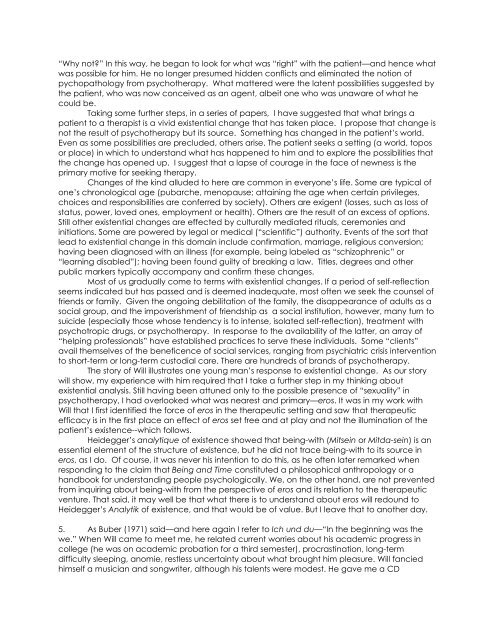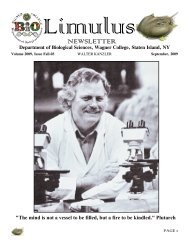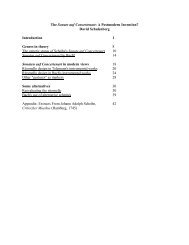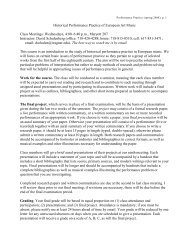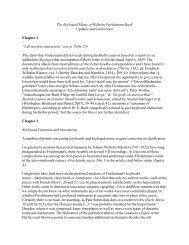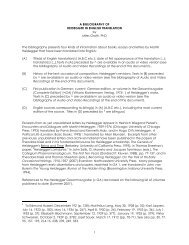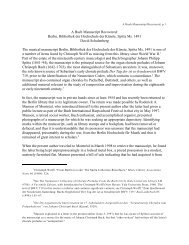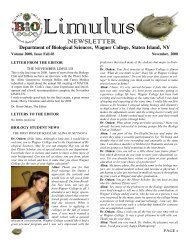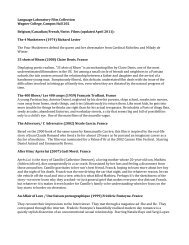SEVEN PAPERS ON EXISTENTIAL ANALYSIS ... - Wagner College
SEVEN PAPERS ON EXISTENTIAL ANALYSIS ... - Wagner College
SEVEN PAPERS ON EXISTENTIAL ANALYSIS ... - Wagner College
Create successful ePaper yourself
Turn your PDF publications into a flip-book with our unique Google optimized e-Paper software.
“Why not?” In this way, he began to look for what was “right” with the patient—and hence what<br />
was possible for him. He no longer presumed hidden conflicts and eliminated the notion of<br />
pychopathology from psychotherapy. What mattered were the latent possibilities suggested by<br />
the patient, who was now conceived as an agent, albeit one who was unaware of what he<br />
could be.<br />
Taking some further steps, in a series of papers, I have suggested that what brings a<br />
patient to a therapist is a vivid existential change that has taken place. I propose that change is<br />
not the result of psychotherapy but its source. Something has changed in the patient’s world.<br />
Even as some possibilities are precluded, others arise. The patient seeks a setting (a world, topos<br />
or place) in which to understand what has happened to him and to explore the possibilities that<br />
the change has opened up. I suggest that a lapse of courage in the face of newness is the<br />
primary motive for seeking therapy.<br />
Changes of the kind alluded to here are common in everyone’s life. Some are typical of<br />
one’s chronological age (pubarche, menopause; attaining the age when certain privileges,<br />
choices and responsibilities are conferred by society). Others are exigent (losses, such as loss of<br />
status, power, loved ones, employment or health). Others are the result of an excess of options.<br />
Still other existential changes are effected by culturally mediated rituals, ceremonies and<br />
initiations. Some are powered by legal or medical (“scientific”) authority. Events of the sort that<br />
lead to existential change in this domain include confirmation, marriage, religious conversion;<br />
having been diagnosed with an illness (for example, being labeled as “schizophrenic” or<br />
“learning disabled”); having been found guilty of breaking a law. Titles, degrees and other<br />
public markers typically accompany and confirm these changes.<br />
Most of us gradually come to terms with existential changes. If a period of self-reflection<br />
seems indicated but has passed and is deemed inadequate, most often we seek the counsel of<br />
friends or family. Given the ongoing debilitation of the family, the disappearance of adults as a<br />
social group, and the impoverishment of friendship as a social institution, however, many turn to<br />
suicide (especially those whose tendency is to intense, isolated self-reflection), treatment with<br />
psychotropic drugs, or psychotherapy. In response to the availability of the latter, an array of<br />
“helping professionals” have established practices to serve these individuals. Some “clients”<br />
avail themselves of the beneficence of social services, ranging from psychiatric crisis intervention<br />
to short-term or long-term custodial care. There are hundreds of brands of psychotherapy.<br />
The story of Will illustrates one young man’s response to existential change. As our story<br />
will show, my experience with him required that I take a further step in my thinking about<br />
existential analysis. Still having been attuned only to the possible presence of “sexuality” in<br />
psychotherapy, I had overlooked what was nearest and primary—eros. It was in my work with<br />
Will that I first identified the force of eros in the therapeutic setting and saw that therapeutic<br />
efficacy is in the first place an effect of eros set free and at play and not the illumination of the<br />
patient’s existence--which follows.<br />
Heidegger’s analytique of existence showed that being-with (Mitsein or Mitda-sein) is an<br />
essential element of the structure of existence, but he did not trace being-with to its source in<br />
eros, as I do. Of course, it was never his intention to do this, as he often later remarked when<br />
responding to the claim that Being and Time constituted a philosophical anthropology or a<br />
handbook for understanding people psychologically. We, on the other hand, are not prevented<br />
from inquiring about being-with from the perspective of eros and its relation to the therapeutic<br />
venture. That said, it may well be that what there is to understand about eros will redound to<br />
Heidegger’s Analytik of existence, and that would be of value. But I leave that to another day.<br />
5. As Buber (1971) said—and here again I refer to Ich und du—“In the beginning was the<br />
we.” When Will came to meet me, he related current worries about his academic progress in<br />
college (he was on academic probation for a third semester), procrastination, long-term<br />
difficulty sleeping, anomie, restless uncertainty about what brought him pleasure. Will fancied<br />
himself a musician and songwriter, although his talents were modest. He gave me a CD


